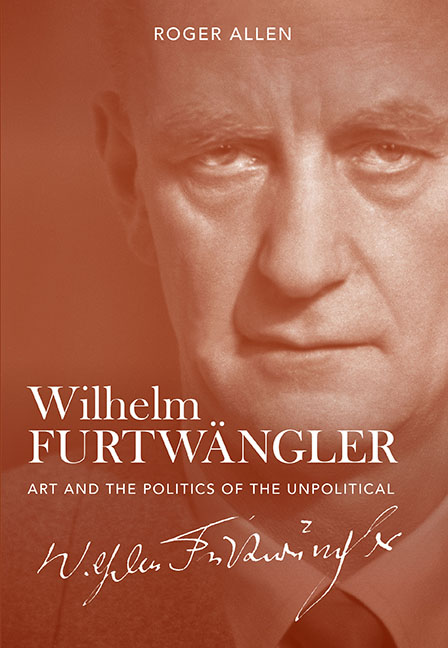Book contents
- Frontmatter
- Dedication
- Contents
- List of Illustrations
- List of Abbreviations
- Prelude
- Acknowledgements
- Preface
- Note on Translations
- Chronology
- Introduction
- 1 Wilhelm Furtwängler: The Historical, Cultural and Intellectual Background
- 2 Childhood and Youth (1886–1911)
- 3 Lübeck and Mannheim (1911–20)
- 4 Furtwängler in the Weimar Republic (1919–33)
- 5 Furtwängler and the Nazi State I (1933–35)
- 6 Furtwängler and the Nazi State II (1935–45)
- 7 Reflection and Reaction: Furtwängler in the Immediate Post-War Period (1945–50)
- 8 Furtwängler as Symphonist
- 9 ‘All Greatness is Simplicity’ (1951–54)
- 10 Afterword
- Appendix 1 Two Furtwängler Essays
- Appendix 2 Thomas Mann, ‘Germany and the Germans’ (1945)
- Appendix 3 Audio and Visual Sources
- Bibliography
- Index
9 - ‘All Greatness is Simplicity’ (1951–54)
Published online by Cambridge University Press: 17 July 2019
- Frontmatter
- Dedication
- Contents
- List of Illustrations
- List of Abbreviations
- Prelude
- Acknowledgements
- Preface
- Note on Translations
- Chronology
- Introduction
- 1 Wilhelm Furtwängler: The Historical, Cultural and Intellectual Background
- 2 Childhood and Youth (1886–1911)
- 3 Lübeck and Mannheim (1911–20)
- 4 Furtwängler in the Weimar Republic (1919–33)
- 5 Furtwängler and the Nazi State I (1933–35)
- 6 Furtwängler and the Nazi State II (1935–45)
- 7 Reflection and Reaction: Furtwängler in the Immediate Post-War Period (1945–50)
- 8 Furtwängler as Symphonist
- 9 ‘All Greatness is Simplicity’ (1951–54)
- 10 Afterword
- Appendix 1 Two Furtwängler Essays
- Appendix 2 Thomas Mann, ‘Germany and the Germans’ (1945)
- Appendix 3 Audio and Visual Sources
- Bibliography
- Index
Summary
Those, I think, who have looked so long and deeply into the complexities of the spirit ask of outward things merely that they should possess one quality above all: simplicity.
The final period of Furtwängler's life was a time during which he gradually regained a measure of his pre-war prestige both at home and abroad, in spite of the fact that the ambivalence of his public position during the years of Nazi rule continued to be a hotly debated and highly contentious issue. From 1948 onwards he became a regular visitor to the annual Salzburg Festival where the operas he conducted included Beethoven's Fidelio (1948); Mozart's Die Zauberflöte and Verdi's Otello (1951), Don Giovanni (1954) and Weber's Der Freischütz (1954). With Don Giovanni, Fidelio and Der Freischütz Furtwängler returned to three works with which he had begun his career as Hofkapellmeister in Mannheim in 1915.
On 29 July 1951 Furtwängler directed Beethoven's Ninth Symphony as part of the reopening ceremony of the Bayreuth Festival after a six-year silence. This iconic event was in many ways a ‘Reconsecration of the House’ after the years of American occupation. It linked back directly in the historical memory not only to the performance conducted by Wagner himself on 22 May 1872 when Furtwängler's mentor, the young Arthur Nikisch, was among the orchestral violinists; but also in more recent times to the appropriation of the work by the Nazis, as exemplified by the performance Furtwängler conducted in Berlin on 19 April 1942, the eve of Hitler's birthday. The reopening of Bayreuth was therefore an event of considerable political as well as cultural significance. Winifred Wagner, daughter-in-law of the composer, Intendant during the Nazi period and close personal friend of Hitler, was forbidden by the occupying powers from taking any further part in the running of the festival. A new administration was formed under the artistic direction of Winifred's eldest son Wieland, whose austere, psychoanalytical productions were in marked contrast to the portentous stagings of Tietjen and Preetorius which had adorned the Festspielhaus stage during the Nazi years. Wieland's productions appeared to signal a break with the festival's immediate past. However, all was not as it seemed.
- Type
- Chapter
- Information
- Wilhelm FurtwänglerArt and the Politics of the Unpolitical, pp. 203 - 224Publisher: Boydell & BrewerPrint publication year: 2018



